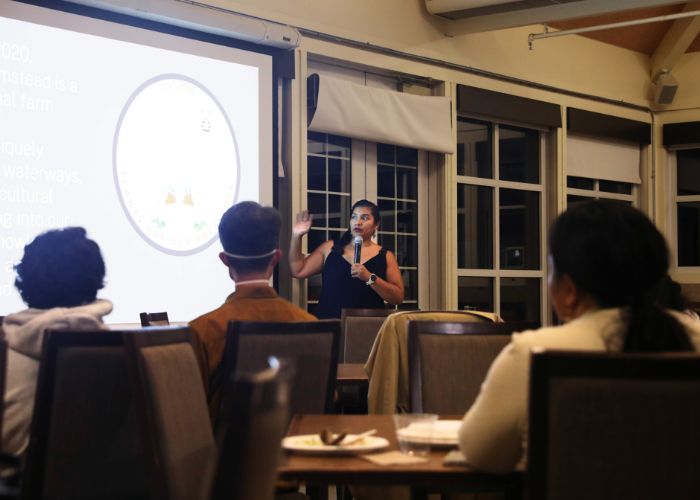
On September 26, the Bailey College of the Environment welcomed farmer and educator Liz Guerra to lead a workshop on BIPOC Farming: Farming with an Intersectional Lens. This was the latest installment in the land justice workshop series “Tending the Soil: Towards Land Justice in CT,” cosponsored by Wesleyan University’s Bailey College of the Environment and the People’s Saturday School. The event aimed to educate and spread awareness about the struggles of BIPOC farmers with land access and systemic racism, while bringing together a mix of Wesleyan students and community members from various organizations across the state. Liz runs SEAmarron Farmstead in Danbury, where she cultivates hemp and many types of vegetables with her partner Hector “Freedom” Gerardo. Hailing from Queens, New York, Liz is a full spectrum doula/birth worker, social justice advocate, and farmer. In addition to her work as an activist and independent farmer, Liz is an Adjunct Faculty in sociology at the University of Connecticut – Stamford.
The first part of the evening was devoted to a catered dinner, giving participants a chance to get to know each other and warm up from the rainy weather. After an hour of passionate conversation over seconds and thirds, the evening’s programming began. She framed the presentation with two key questions: How do we change the image of farmers to include people of different identities? And how do we make the act of farming more accessible to those with diverse identities? Only 5% of farmers in Connecticut identify as nonwhite, compared to 38% of the state’s population. Furthermore, data on the gender expression or sexual orientation of farmers is not collected, and farm workers are excluded from these data altogether. These inequalities are far from accidental, reflecting a long history of legislative hurdles placed in the paths of BIPOC farmers struggling to access land and achieve financial stability.
Starting and maintaining a farm is an arduous process with high upfront costs, often falling into the six-figure range. As a result, it is common practice for farmers to take out hefty loans to begin and maintain their farms. Farmers of color are often targeted with racial discrimination by the government agencies they must depend upon for assistance. Liz illustrated the issue of systemic racism with her personal experience. She recounted a story of when she and her partner called a city zoning agent for information about their property. The agent denied them any assistance, and treated her partner rudely due to his accented English. When a white family friend made the same request on their behalf, he was met with far more cordiality and granted the information with ease. As a farmer, how your identity is perceived by those in power can mean the difference between receiving much-needed assistance or hastening your path to financial ruin.
Black farmers are commonly denied loans or given predatory loans by agencies like the USDA, trapping them in cycles of debt. These struggles are exemplified by the 1999 Pigford v. Glickman court case, reflected on by one participant as “the most important civil rights case in U.S. history.” The landmark case was a class action discrimination lawsuit brought by Black farmers against the United States Department of Agriculture. The lawsuit held the USDA responsible for racial discrimination in the loan approval process, which had led to many Black farmers losing their farms to foreclosure. In the largest civil rights settlement in U.S. history, $1 billion would be distributed to approximately 16,000 affected farmers. Many plaintiffs never received the settlement funds as promised, and to this day Black farmers continue to be left behind by the USDA lending process. Due in large part to the deeply entrenched racism of the USDA, land ownership of Black and BIPOC farmers has decreased significantly over the last century.
In the second half of her presentation, Liz also emphasized the myriad ways in which farming has enriched her life and the lives of those in her community. Liz describes SEAmarron Farmstead as multigenerational, including both her and her partner’s parents and their son, with other elders offering support. Working the land together has allowed Liz’s son and mother to forge a deep connection and preserve her mother’s agricultural knowledge. Liz lamented the fact that “we don’t value our elders in the way that we should,” and expressed that farming together will help rebuild this connection, as her mother and son have done. Additionally, Liz described the practice of seed saving as key to both cultural preservation and food sovereignty. Seeds and plants tell the story of people and communities as well as enabling our survival. Sharing these precious seeds allows farmers to support each other, build community, and stay connected. When Liz’s friends and community members gift her plants or seeds, she enjoys staying in touch with them by sharing updates about the plant’s progress, she explained with a smile. To farm from an intersectional lens, we must “stop looking at crops not as commodities, but as our ancestors.”
Liz concluded her presentation with a call to action, emphasizing the core principles of allyship. Firstly, it’s important to take the initiative to educate yourself, rather than expecting others to do so for you. Furthermore, everyone should learn what their unique gift is, and use their privilege (whatever that may be) to open doors that have been historically closed to others. As an ally it’s crucial to practice active listening, especially giving space to young people and the fresh perspectives they bring. Finally, she reiterated her main message from Fannie Lou Hamer “Nobody’s free until everybody’s free.” This workshop was impactful to participants to get a firsthand perspective on the beauty, strengths and challenges of BIPOC farming in CT and to consider actions they can take on the individual, collective and institutional level to support BIPOC farmers in the future.